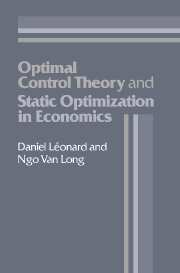Book contents
- Frontmatter
- Contents
- Preface
- 1 Static optimization
- 2 Ordinary differential equations
- 3 Introduction to dynamic optimization
- 4 The maximum principle
- 5 The calculus of variations and dynamic programming
- 6 The general constrained control problem
- 7 Endpoint constraints and transversality conditions
- 8 Discontinuities in the optimal controls
- 9 Infinite-horizon problems
- 10 Three special topics
- Bibliography
- Index
10 - Three special topics
Published online by Cambridge University Press: 05 June 2012
- Frontmatter
- Contents
- Preface
- 1 Static optimization
- 2 Ordinary differential equations
- 3 Introduction to dynamic optimization
- 4 The maximum principle
- 5 The calculus of variations and dynamic programming
- 6 The general constrained control problem
- 7 Endpoint constraints and transversality conditions
- 8 Discontinuities in the optimal controls
- 9 Infinite-horizon problems
- 10 Three special topics
- Bibliography
- Index
Summary
Problems with two-state variables
Nearly all the models hitherto encountered in this book have contained a single state variable. (Exceptions are the models of Sections 8.1, 8.3, and 9.6.) We have relied very heavily on phase diagrams in shedding light on the optimal solution. When there are two state variables, however, the (state, costate) space is four-dimensional and cannot be represented straightforwardly. It must be understood that, given the usual regularity conditions, we have in the maximum principle a set of necessary and sufficient conditions for an optimum, whatever the size of the problem, and if all functional forms and other restrictions were fully specified, we could – possibly using numerical methods – provide an explicit solution to the problem. However, since most models of interest in economic theory involve some unspecified functional forms, an explicit solution is normally unobtainable. This is why phase diagrams are such a useful device for pulling together all the pieces of information contained in the maximum principle.
Since they fail us here, we must devise other means of synthesizing the information. Unfortunately, this is often quite difficult, and in many cases a complete characterization of the solution escapes us. This is not to say that we cannot offer a partial characterization of the solution. It is the aim of this section to illustrate what can indeed be done. First note that in the models of Sections 8.1 and 8.3, the analysis was reduced to a two-dimensional phase diagram. The reader is referred to those sections.
- Type
- Chapter
- Information
- Optimal Control Theory and Static Optimization in Economics , pp. 307 - 344Publisher: Cambridge University PressPrint publication year: 1992



